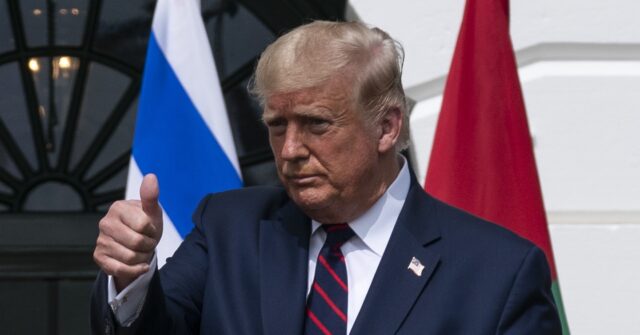In a recent interview with Saudi-owned Al-Arabiya News, former President Donald Trump expressed his belief that Israel should remain steadfast in its military operations against Hezbollah, particularly following recent leadership changes within the group due to the killings of key figures like Hamas leader Yayha Sinwar and Hezbollah leader Hassan Nasrallah. Trump noted that his communications from sources in Lebanon indicated a willingness on Hezbollah’s part to negotiate, albeit not from a position of strength. This perspective arose amidst an escalating humanitarian crisis, where a million individuals have been displaced and thousands killed. The interviewer, Nadia Bilbassy-Charters, cited public sentiment that Trump could play a pivotal role in influencing Israeli Prime Minister Benjamin Netanyahu to stop the ongoing war, a sentiment Trump echoed by acknowledging his established relationships with regional leaders.
Hezbollah, with its backing from Iran and a stronghold among Lebanon’s Shia population, faces significant resentment from other Lebanese factions for its role in igniting hostilities with Israel. In the interview, Trump reiterated claims made previously about the impacts of the October 7 terror attack and the subsequent conflict in Gaza. He suggested that if he were still in office, these violent outbursts would not have occurred. Furthermore, he asserted that Netanyahu needed to take decisive actions against Iranian nuclear and oil facilities in retaliation for Iran’s missile threats. Trump implied that the Biden administration’s policy has been ineffective and that often the best course was to contradict Biden’s suggestions, although he expressed a desire for positive relations with the Iranian populace in the future.
Addressing the topic of Israeli hostages held by Hamas, Trump exhibited a grim outlook, indicating that while he would prioritize their immediate release, there was a high probability that many were already dead. Notwithstanding this, Trump remained optimistic about achieving lasting peace in the Middle East, claiming a strong conviction that such a resolution would manifest soon, especially in light of the upcoming elections. He also highlighted his intentions to expand the Abraham Accords, which had progressed towards a potential Saudi-Israeli rapprochement before he left office. The Biden administration had attempted to broker a peace deal before the escalation of violence, but reportedly blocked initiatives lacking implications for a Palestinian state, which was not a significant priority for Saudi Arabia.
During the interview, Bilbassy-Charters noted Trump’s impending status as a grandfather to a child of Lebanese heritage, reflecting the personal connections he has developed through family ties. His eldest daughter, Tiffany Trump, is expecting her first child with Lebanese-American Michael Boulos, while his daughter Ivanka is Jewish, having married Jared Kushner. This unique family background seemed to inform Trump’s appreciation for the Lebanese people and their achievements, as he expressed a sense of hope for eventual peace and stability in Lebanon and the broader region.
Trump’s remarks reflect long-standing themes from his presidency regarding foreign policy in the Middle East, including a complex web of diplomacy involving key players such as Israel, Hezbollah, and Iran. His confidence that peace can be brokered suggests that he sees opportunity in the chaotic political landscape, despite the significant challenges posed by violence and humanitarian crises. The intertwining of family heritage with geopolitical issues also underscores the personal stakes he has in the region, which may resonate with voters and constituents concerned about foreign relations.
As a significant voice in contemporary political discourse, particularly as the United States gears up for future elections, Trump’s statements contribute to ongoing debates about the most effective strategies for peace in regions plagued by conflict. His narrative emphasizes a strong and decisive Israel, advocating for military action where necessary while maintaining an optimistic outlook that reflects a belief in diplomacy and dialogue. The implications of his views extend beyond mere rhetoric, as they could influence both public opinion and potential policy directions should he pursue a return to political office.

